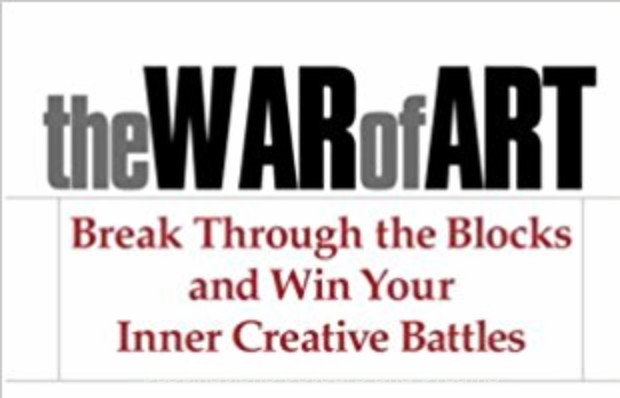A few years ago I heard about the book the War of Art by Steven Pressfield. I started looking for it in every book store I went to. I eventually found it. I have now read my copy twice and skimmed through it a third time. I continue to have mixed feelings about the book and am not sure what I think of it.
The small, primarily motivational book subtitled Break Through the Blocks and Win Your Creative Battles was originally published in 2002. It contains a number of quote-worthy lines, but I continue to have mixed feelings about the book and am still discerning what its message is for me.
The book is divided into three sections or “books”, each with its own focus.
Book 1: Resistance: Defining the Enemy
Book 1 is about resistance. I think most artists will be able to connect with some part of this section. Pressfield describes what resistance feels like and how it manifests itself, procrastination being the most common manifestation. There is often something holding us back, be it self-doubt, waiting for inspiration, or other commitments. The points posed by Pressfield in this section cause you to look deeper and differently at your own ways of resisting, but he goes too far and loses credibility when he suggests resistance is the root of all troubles, including physical and mental illnesses, neuroses, and addictions, without any background or supporting research.
“Resistance cannot be seen, touched, heard, or smelled. But it can be felt.”
“Resistance has no strength of its own. Every ounce of juice it possesses comes from us. We feed it with power by our fear of it.”
Book 2: Combating Resistance: Turning Pro
In this section, Pressfield uses the principles of professionalism to define the path to combating resistance. Things like showing up every day, being committed but not over-identifying with our “job”, and mastering technique. It is the most practical section of the book. It feels freeing, although the advice isn’t radical or even new. As Pressfield states near the end of the section, “There’s no mystery to turning pro.”
“The amateur believes he must first overcome his fear, then he can do the work. The professional knows that fear can never be overcome.”
“The professional keeps his eye on the doughnut and not on the hole.”
Book 3: Beyond Resistance: The Higher Realm
Many other reviewers have pointed out that the third section of the book is totally different than the other two and feels like a completely different book. That is true. Here, Pressfield moves into the metaphysical realm and talks about the “invisible psychic forces that support and sustain us on our journey toward ourselves.” He uses terms like angels and muses. In a couple of chapters, he talks about Ego versus Self, which can be a difficult concept even if it is not new to you. Based on reviews and comments I’ve read, this section appears to be the one many people had the most trouble with.
Although I did not find this section particularly motivating, I did find it philosophically interesting. This is the section I am most likely to read again, mostly to think more about its concepts than gain insight into the art of writing.
“Artists have invoked the Muse since time immemorial. There is great wisdom to this. There is magic to effacing our human arrogance and humbly entreating help from a source we cannot see, hear, touch, or smell.”
The Bottom Line
Is this book one you should read? Maybe, maybe not. If you are looking for writing advice or artistic direction, find another book. If you are looking for motivation, this book may be for you, but its appeal as a motivator is certainly not universal. Your reactions to what you read in the War of Art are likely to prompt you to question and think about your own feelings toward your craft. That can be a good thing. The book is structured is such as way that one could read any of its short chapters independently, at any time.
Although the book left me feeling unsatisfied, the message I’ve chosen to take from it is contained in the last paragraph of the book.
“Creative work is not a selfish act or a bid for attention on the part of the actor. It is a gift to the world and every being in it. Don’t cheat us of your contribution. Give us what you’ve got.”
Have you read this book? What did you think?

I did read this book. I found encouragement in his focus on writing what is in our hearts instead of writing for rewards. I think the battle artists often fight is the crisis of self-confidence. We are easily overwhelmed when we allow others to define what success looks like (think Amazon algorithms). That is why I also love the concept of the Muse.
Hope you are having a nice summer, Donna!
Sydney, I too like the concept of the Muse. I agree the fight is often a crisis of self-confidence. I hope you are a having a good summer, too.